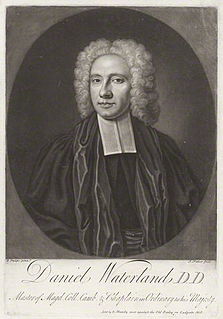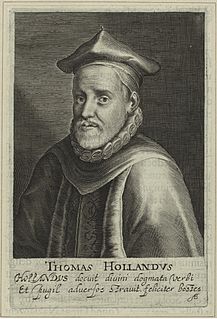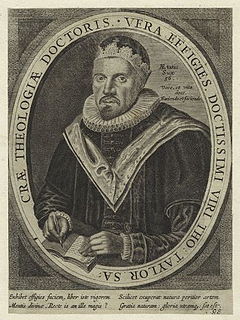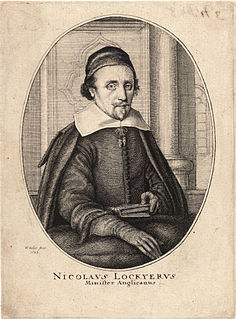Related Research Articles

Thomas Morton was an English churchman, bishop of several dioceses. Well-connected and in favour with James I, he was also a significant polemical writer against Roman Catholic views. He rose to become Bishop of Durham, but despite a record of sympathetic treatment of Puritans as a diocesan, and underlying Calvinist beliefs shown in the Gagg controversy, his royalism saw him descend into poverty under the Commonwealth.

Daniel Cosgrove Waterland was an English theologian. He became Master of Magdalene College, Cambridge in 1714, Chancellor of the Diocese of York in 1722, and Archdeacon of Middlesex in 1730.

Thomas Holland was an English Calvinist scholar and theologian, and one of the translators of the King James Version of the Bible.

Richard Smyth was the first person to hold the office of Regius Professor of Divinity in the University of Oxford and the first Chancellor of the University of Douai.
Edmund Weaver was a draper and a bookseller in London in the 17th century.
Anthony Burges or Burgess was a Nonconformist English clergyman, a prolific preacher and writer.

John King was the Bishop of London in the Church of England from 1611 to 1621.

Thomas Ravis was a Church of England bishop and academic. He was among those engaged in translating the King James Bible.
Henry Wilkinson (1610–1675) was an English clergyman, in the Commonwealth period a canon of Christ Church, Oxford, Lady Margaret Professor of Divinity, and member of the Westminster Assembly. Later he was a nonconformist preacher.

Thomas Taylor (1576–1632) was an English cleric. A Calvinist, he held strong anti-Catholic views, and his career in the church had a long hiatus. He also attacked separatists, and wrote copiously, with the help of sympathetic patrons. He created a group of like-minded followers.

Nicholas Lockyer (1611–1685) was an English clergyman and Independent minister, a close supporter of Oliver Cromwell and Provost of Eton College, and later an ejected minister and nonconformist.
William Goodwin was an English churchman and academic, Dean of Christ Church, Oxford from 1611.
Sir Humphrey Lynde (1579–1636) was an English lay Puritan controversialist and politician who sat in the House of Commons in 1626.
Francis Babington D.D. was an English divine and an academic administrator at the University of Oxford. He was elected Master (head) of Balliol College, Oxford on 2 September 1559, a post he held until he resigned the following year on 27 October 1560. Babington was Vice-Chancellor of Oxford University from 1560 to 1562. He was also Rector of Lincoln College, Oxford from 1560 until he resigned in 1563.
Immanuel Bourne (1590–1672) was an English cleric.
Thomas Playfere was an English churchman and theologian, Lady Margaret's Professor of Divinity at Cambridge from 1596.

Johannes Wtenbogaert was a Dutch Protestant minister, a leader of the Remonstrants.
John Stoughton (1593?–1639) was an English clergyman, of influential millennial views. He was the stepfather and preceptor in their youth of Ralph Cudworth and James Cudworth.
Sir Thomas Higgons was an English diplomat and politician who sat in the House of Commons at various times between 1659 and 1687.
George Rust was an English Anglican academic and churchman, who became bishop of Dromore in 1667. He is known as a Cambridge Platonist and associate of Jeremy Taylor.
References
- 1 2 3 4 5 6 7 Pearce 1891.
- ↑ Ryan, Antony Charles. "Higgons, Theophilus". Oxford Dictionary of National Biography (online ed.). Oxford University Press. doi:10.1093/ref:odnb/13241.(Subscription or UK public library membership required.)
- Attribution
![]() This article incorporates text from a publication now in the public domain : Pearce, Nigel Douglas Frith (1891). "Higgons, Theophilus". In Lee, Sidney (ed.). Dictionary of National Biography . 26. London: Smith, Elder & Co.
This article incorporates text from a publication now in the public domain : Pearce, Nigel Douglas Frith (1891). "Higgons, Theophilus". In Lee, Sidney (ed.). Dictionary of National Biography . 26. London: Smith, Elder & Co.